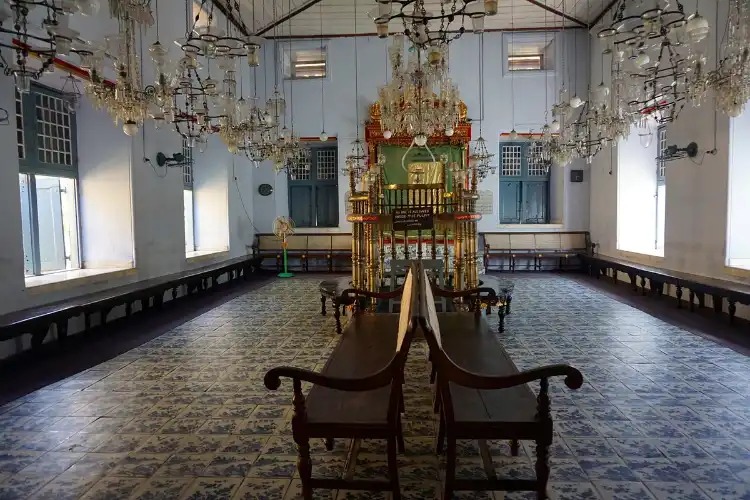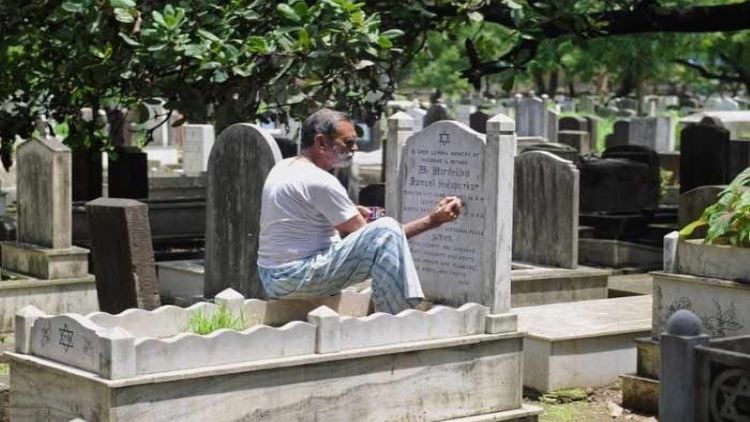
Ghaus Siwani / New Delhi
The aroma of spices wafts along the gentle breeze coming from the nearby Arabian Sea; groups of tourists walk in this unusually quiet business corner of Mattancherry in the port city of Kochi.
Through the paved lane lined with wholesale shops of spices, they are headed to the 'Pardesi' (Jewish) Synagogue, the oldest shrine of Judaism in India.
This is, however, not like any other shrine; it’s special because not only it’s the oldest Jewish shrine in Djokovic, Kerala in Hebrew, but it’s also one of the oldest synagogues in the world, built over 450 years ago.
Two years ago, Jews from all over the world came to celebrate its foundation day. They were those who or their families had once lived in Kochi and later migrated to Israel or European countries after the founding of Israel. The name ‘Pardesi’ Synagogue was given by the locals to commemorate the shrine of those who once worshipped here and have since left.
Chinese tiles renovated
The two-floor building is a symbol of pristine art and is preserved with great effort. It’s said that it was built in 1568 and rebuilt in 1664, using beautiful tiles sourced from Jimson Canton (China).
In 1805, the Maharaja of Travancore offered a gold crown at this synagogue.
Later, Lord Curzon, being kind to the British Jews, visited this historic synagogue on 19 November 1900.
Jewish Center
Mattancherry is known as the Jewish center in India, where many Jewish artifacts are still preserved. The tourists walk quietly in this fragile yet pristine building keeping in view the noise pollution can also harm the structure, and also in awe of its uniqueness.
The oldest Jew in Mattancherry was Sarah Cohen who died in 2019 at the age of 96.
Sara's acquaintance is Taha Ibrahim, a tailor, who specializes in sewing Jewish hats.

A painter writing on a tombstone at Mumbai Jewish cemetery
Taha Ibrahim, 50, says, as a child, he used to sell souvenirs and postcards to tourists in Mattancherry. One day, his uncle introduced him to a Jewish couple. Aunt Sarah and Uncle Jacob allowed him to keep his postcards at home and that’s how their relationship began.
Jacob, he says, was a lawyer, while Sara used to sew many types of clothes. One day when he needed an assistant, he started seeking help from Taha.
Jacob died some 20 years ago leaving Sarah alone as the couple had no children. After his death, Sara needed Ibrahim's help in sewing. After Sarah died, Ibrahim launched his own shop.
Sarah's relatives had moved to Israel or other countries. However, most of the youngsters were advised by their elders against leaving their homeland. So, without any blood relations being around, Sara passed away just three days before she was to celebrate her 97th birthday.
Jewish-Muslim Brotherhood
It will be interesting to note here that since the establishment of Israel, relations between Muslims and Jews around the world have been affected, but in Kochi, the two communities had lived in mutual love and harmony.
An example of this relation is Taha Ibrahim, who lived off by stitching colorful skull caps of Jews and also cherishes his long relationship with Uncle Jacob and Aunt Sarah.
Abraham says that he wants to preserve the Jewish monuments in his hometown and elsewhere.
According to the Times of Israel, there were about 3,000 Jews in Kochi in the 1980s. However, Ibrahim says there are now only 25 Jews left in the city.
According to reports, most Jews had migrated to Israel, the United States, Canada, Australia, and other countries.
Miralia had left Cochin for Israel and she felt the Jewish culture in Cochin was amazing.
According to her, the Jews here were very religious and most of them were businessmen. He had good relations with people of other cultures.
She says that Indian society was very tolerant and people respected each other.
The Story of Kochi Jews
The relationship between Arabs and Indians is very old. History books state that the history of these relationships is thousands of years old.
Thousands of years ago, Arab people flocked to the coastal areas of India.
That's why many religions also came together in India. At least three religions came to India from the Arab land, including Judaism, Christianity, and Islam.
Coincidentally, the three religions reached the coastal areas of South India for the first time.
History of Indian Jews:
